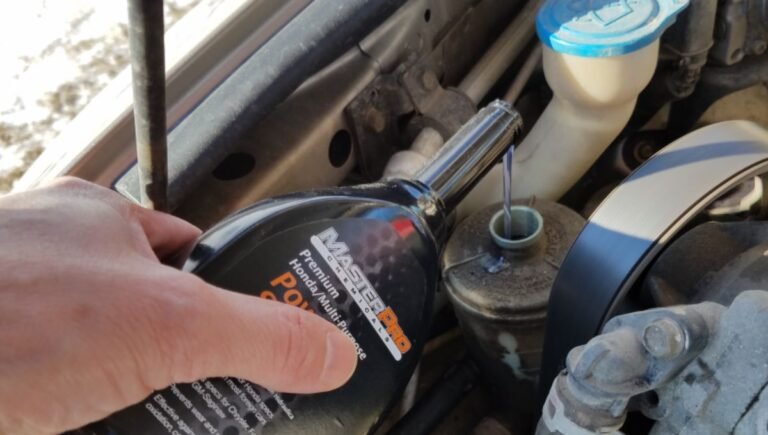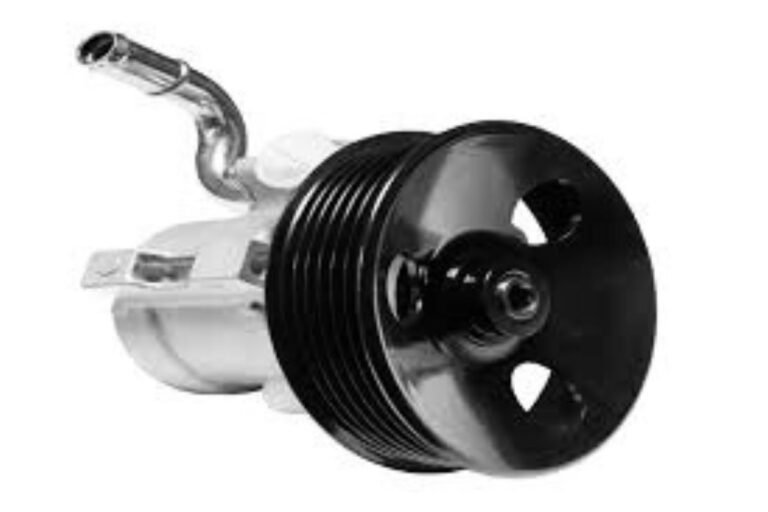Can You Use Brake Fluid for Power Steering? Know the Risks!
Yes, brake fluid can be used for power steering, but it is not recommended. Brake fluid is designed for the hydraulic systems of brakes, while power steering fluid is formulated specifically for power steering systems.
Using the wrong fluid can cause damage to the power steering system and compromise its performance. Power steering fluid is a hydraulic fluid that is used to assist the driver in turning the steering wheel. It is designed to withstand high temperatures and pressures, and contains additives that help prevent wear and tear on the system’s components.
Brake fluid, on the other hand, is designed to withstand even higher temperatures and pressures, but it lacks the additives that are necessary for proper power steering function. While it is possible to use brake fluid in a pinch, it is always best to use the recommended fluid for your vehicle’s power steering system to ensure optimal performance and longevity.
Brake Fluid Vs Power Steering Fluid: Key Differences
When it comes to vehicle maintenance, it’s crucial to understand the key differences between brake fluid and power steering fluid. Both fluids serve distinct purposes in the proper functioning of a vehicle’s braking and steering systems. Let’s explore the chemical composition and intended functions of these essential fluids.
Chemical Composition
Brake Fluid: Typically, brake fluid is composed of glycol-ether compounds, which are hygroscopic in nature. This means they readily absorb moisture from the surrounding environment, making it essential to seal brake fluid containers tightly.
Power Steering Fluid: In contrast, power steering fluid is primarily composed of mineral oil or synthetic oil, which do not have hygroscopic properties. This composition helps maintain the integrity of the power steering system by minimizing the risk of moisture accumulation.
Intended Functions
Brake Fluid: Its primary function is to transmit the pressure from the master cylinder to the brake calipers or wheel cylinders, facilitating the necessary force to stop the vehicle. Moreover, it operates under high temperatures, making it essential for brake fluid to have a high boiling point to prevent vapor lock.
Power Steering Fluid: This fluid is specifically designed to lubricate and provide hydraulic pressure to the power steering system, enabling smooth and responsive steering. It also helps in reducing wear and tear on the components of the power steering system, ensuring its longevity and optimal performance.
The Role Of Fluids In Vehicle Mechanics
Importance Of Brake Fluid
Brake fluid is crucial for transferring force from the brake pedal to the brake pads, enabling effective stopping power.
Purpose Of Power Steering Fluid
Power steering fluid assists in reducing the effort needed to turn the steering wheel, contributing to smoother and more manageable steering.
Potential Risks Of Misusing Brake Fluid
Using brake fluid for power steering can lead to potential risks like system damage and compromised safety. Brake fluid is not designed for power steering systems, which require specific fluids to function properly. Misusing brake fluid in power steering can result in leaks, component deterioration, and ultimately, unsafe driving conditions.
Using the wrong type of fluid in your vehicle’s power steering system can cause serious problems, including damage to the vehicle’s power steering pump and other components. One of the most common mistakes people make is using brake fluid in their power steering system, which can have some potential risks.Corrosion And Damage
Brake fluid is designed to work in a completely different type of hydraulic system than power steering fluid. Brake fluid is hygroscopic, which means it absorbs water over time. This is necessary for the brake system to function properly, but it can be a problem when used in a power steering system. Water can cause corrosion and damage to the power steering pump, steering rack, and other components. Over time, this can lead to leaks, reduced performance, and even total system failure.Safety Hazards
Using brake fluid in a power steering system can also pose safety hazards. Brake fluid has a lower boiling point than power steering fluid, which means it can boil under high temperatures and cause the power steering system to fail. This can result in a loss of control of the vehicle, which could lead to an accident. In addition, brake fluid is highly flammable, which makes it a fire hazard if it comes into contact with hot engine components. In conclusion, using brake fluid in a power steering system can have serious consequences. It can cause corrosion and damage to the system, as well as pose safety hazards. It is important to always use the manufacturer-recommended fluid for your vehicle’s power steering system to avoid these potential risks.Why Brake Fluid Should Not Be Used In Power Steering
Brake fluid should not be used in power steering as they have different compositions and functions. Power steering fluid is specially formulated to handle the system’s demands, ensuring optimal performance and longevity. Using brake fluid can cause damage and compromise the power steering system’s effectiveness.
Lubrication Properties
Brake fluid and power steering fluid may seem similar in function, but they have distinct differences when it comes to lubrication properties. Brake fluid is specifically formulated to work in the brake system, where it needs to withstand high temperatures and provide consistent hydraulic pressure to enable effective braking. On the other hand, power steering fluid is designed to lubricate and protect the power steering system, ensuring smooth and effortless steering.
Hydraulic System Compatibility
While both brake fluid and power steering fluid are hydraulic fluids, they are not interchangeable due to their different compositions and compatibility with specific systems. Brake fluid, typically made from glycol-based compounds, is incompatible with the seals and components found in power steering systems. The use of brake fluid in power steering can lead to damage and premature wear of seals, resulting in leaks and potentially costly repairs.
Power steering fluid, on the other hand, is specifically formulated to work with the seals and components found in power steering systems. It provides the necessary lubrication and protection to ensure the smooth operation of the power steering system, preventing leaks and maintaining optimal performance.
Using brake fluid in power steering can compromise the functionality and safety of the power steering system, leading to potential steering issues while driving. It is crucial to use the recommended fluid for each specific system to ensure proper functioning and avoid any potential damage or safety hazards.
Understanding The Consequences
Using brake fluid for power steering can lead to serious consequences as the two fluids have different compositions. Brake fluid is not compatible with power steering systems, which could result in damage and safety issues. It is crucial to use the recommended fluid for each system to avoid costly repairs.
Using the wrong type of fluid in your power steering system can have serious consequences for your vehicle’s performance and safety. When it comes to power steering fluid, many car owners wonder if they can use brake fluid as a substitute. However, it’s crucial to understand the short-term malfunctions and long-term implications that can arise from using brake fluid in your power steering system.
Short-term Malfunctions
Short-term malfunctions can occur when you use brake fluid instead of power steering fluid in your vehicle. Brake fluid is specifically designed to handle the high temperatures and pressures of the braking system, whereas power steering fluid is formulated to lubricate and assist in the smooth operation of the power steering system.
When brake fluid is used in the power steering system, it can lead to a range of immediate issues. These may include:
- Increased friction and wear on power steering components
- Reduced lubrication, resulting in noisy and stiff steering
- Increased risk of leaks and fluid contamination
- Impaired steering response and control
It’s essential to recognize that power steering fluid and brake fluid have different compositions and properties. Using the wrong fluid can compromise the performance of your power steering system and pose a safety risk.
Long-term Implications
The consequences of using brake fluid in your power steering system extend beyond short-term malfunctions. Over time, the use of brake fluid can cause severe damage to the power steering components, leading to costly repairs and potential safety hazards.
Long-term implications of using brake fluid in the power steering system may include:
- Accelerated wear and deterioration of seals and hoses
- Corrosion and damage to internal components
- Increased likelihood of power steering pump failure
- Compromised steering stability and control
These long-term implications highlight the importance of using the correct fluid for your power steering system. Neglecting this can result in significant mechanical issues and compromise your vehicle’s overall performance and safety.
In conclusion, while brake fluid may seem like a convenient substitute for power steering fluid, it is crucial to understand the consequences of such a choice. The short-term malfunctions and long-term implications can lead to costly repairs, safety hazards, and compromised vehicle performance. Always consult your vehicle’s manual or a professional mechanic to ensure you are using the correct fluid for your power steering system.
Correct Fluid Usage: Best Practices
Manufacturer’s Recommendations
Always consult your vehicle’s manufacturer to determine the correct type of brake fluid and power steering fluid. Using the wrong fluid can cause damage to your vehicle’s steering and braking systems.
Routine Maintenance Checks
Regularly check the levels and condition of both brake fluid and power steering fluid. Low levels or contaminated fluid can lead to decreased performance and potential safety hazards. Refer to your vehicle’s manual for specific inspection intervals.
Addressing Accidental Mix-ups
Brake fluid should not be used in power steering systems as it can cause damage. Power steering fluid is specifically formulated to meet the requirements of power steering systems and using the wrong fluid can lead to malfunctions and expensive repairs.
Always use the recommended fluid to prevent any accidental mix-ups.
Immediate Steps To Take
In the event of an accidental mix-up between brake fluid and power steering fluid, quick action is crucial. First, do not start the vehicle to prevent further damage.Professional Assessment And Repair
Seek professional help immediately to avoid extensive repairs.Conclusion
To sum up, using brake fluid for power steering is not recommended. It can cause damage. Stick to the manufacturer’s recommendations for optimal performance and safety. Regular maintenance and using the right fluids will keep your vehicle running smoothly. Prioritize safety and follow guidelines for a well-functioning car.

Specializes on car underchassis & power steering repair. We have experienced mechanic to attend all your underchassis & power steering repair needs.



